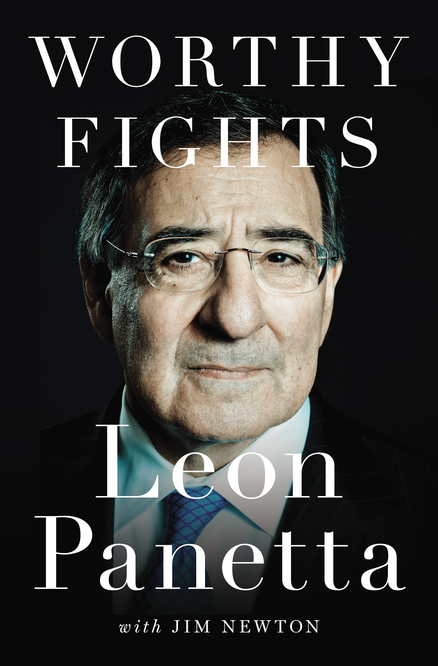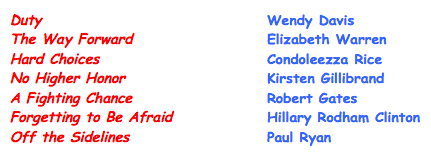October 9, 2014
Leon Panetta’s memoir kind of goes after Obama, has great title
by Mark Krotov

Will you *look* at that title? That’s a title!
The publishing industry has many unsung heroes, but some of the most unsung, and the most heroic, are the people that have to come up with titles of political memoirs. This is a challenging process, subject to many constraints. The title can’t be too attention getting, because the politician in question must be dignified and sober; and it can’t be too cheeky, because the politician must convey seriousness; and it can’t be too specific, because the politician needs his or her royalty checks, and for those to flow in, a general readership must be courted.
So here’s to the triumphant editor, agent, Penguin Press editorial assistant, William Morris Endeavor intern, or totally random person on the street who came up with the title of former defense secretary Leon Panetta’s new book Worthy Fights, which was published this week. Worthy Fights. This is like the platonic ideal of political memoir titles. It has everything—struggle, rectitude, humblebragging, the implicit but seductive suggestion of physical conflict. That’s a lot to squeeze into two words!
The other great thing about Worthy Fights? It’s completely generic. To prove this point, I present the below list of seven recent political memoirs, along with the names of their authors, in random order. If you can match all seven correctly without looking at the answers at the bottom of this post—I believe in the honor system—e-mail me at mark at mhpbooks.com, and you’ll receive a personalized e-card commending you for your titular prowess. (I’ve excluded from this list Donald Rumsfeld’s Known and Unknown, which is brilliant and evil but also pretty obvious, and Timothy Geithner’s Stress Test, which is wonky and reasonably cheeky and could only be the tile of a memoir by Timothy Geithner.)
 That was hard, wasn’t it? You know what’d be even harder? Actually reading these memoirs. I’m sure that some of them are fine, of course, and Forgetting to be Afraid has a pretty terrific cover, but think about it: do you really want to subject yourself to 784 PAGES of Condoleezza Rice? You don’t. I know you don’t.
That was hard, wasn’t it? You know what’d be even harder? Actually reading these memoirs. I’m sure that some of them are fine, of course, and Forgetting to be Afraid has a pretty terrific cover, but think about it: do you really want to subject yourself to 784 PAGES of Condoleezza Rice? You don’t. I know you don’t.
There is, however, a category of people whose job it is to subject themselves to these kinds of books, and that category of people is political reporters. (Well, also book reviewers, but at least the reviewers get to say if the book sucks or not—the reporters have to stay neutral.) Political reporters read these books in search of insights and revelations scattered among sentences like this one, from Paul Ryan’s book: “I was—and am—proud of the budget proposals we produced, but they contained the kind of specifics that can be easily mischaracterized in the rough-and-tumble, sound-bite atmosphere of a presidential campaign.” Oof.
The Los Angeles Times’s Paul Richter read Panetta’s memoir, and he found some revelations! Like this:
Although Obama had developed a coherent foreign policy, the president also “avoids the battle, complains and misses opportunities,” Panetta says. The president erred recently in ruling out the use of ground troops against Islamic State militants, in Panetta’s view, and in failing to seek congressional approval for the campaign.
In his article, Richter links Panetta’s somewhat critical remarks of Obama to those made by Hillary Clinton and Robert Gates in their recent memoirs:
All presidents have had in-house critics. But rarely has a president faced the degree of public criticism from former senior Cabinet members that Obama has this year. The critiques are particularly notable because they have appeared while Obama is still in office, struggling with a world beset with crises. Panetta’s Worthy Fights has appeared as the midterm election approaches, when criticism of Obama could boost his Republican opposition.
What to make of this? Richter is very good on the possible explanations for Panetta’s—and Clinton’s and Gates’s—outbursts, though he doesn’t mention that all of this might be due to the fact that, according to a very trustworthy Facebook group, Obama Is Officially The Worst President In American History! Typical liberal bias.
Richter writes that “the stigma about critical tell-all books seems to have eased,” and this seems right. Despite their either overtly heroic or modestly heroic titles, most of these political memoirs are far from timeless (even those that, in about five years, find themselves reviewed in the New York Review of Books by Joan Didion or Mark Danner), and their authors know that the opportunity to capitalize on Americans’ brief attention spans is, like all great things, available for a limited time only.
Which is why, as you read this, there is a tired, hungry literary agency assistant sitting in a stuffy basement somewhere in midtown Manhattan, trying desperately to figure out the ideal combination of wholesomeness and inspiration that will make the title of Secretary of Agriculture Tom Vilsack’s forthcoming memoir briefly unforgettable. Dear literary agency assistant: if you’re listening, may we suggest Whole Grain?
Answers
Duty: Robert Gates
The Way Forward: Paul Ryan
Hard Choices: Hillary Rodham Clinton
No Higher Honor: Condoleezza Rice
A Fighting Chance: Elizabeth Warren
Forgetting to Be Afraid: Wendy Davis
Off the Sidelines: Kirsten Gillibrand
Mark Krotov is senior editor at Melville House.